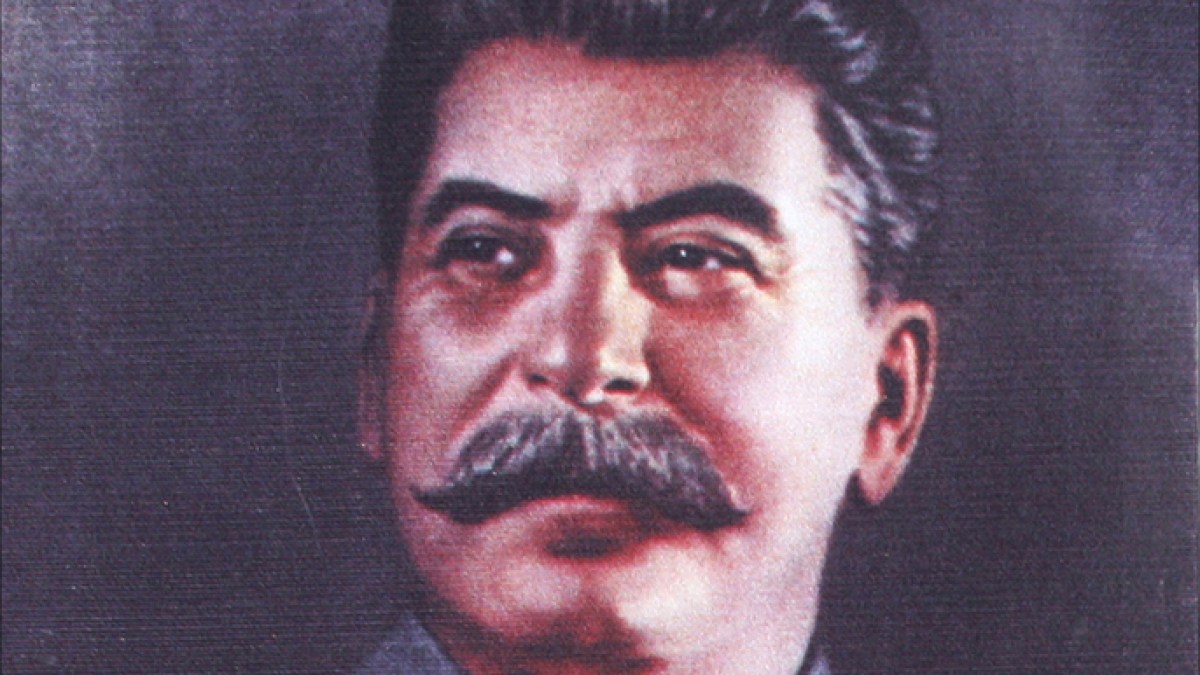Soviet politician, born in Georgia and led the Soviet Union, his mother wanted him as a cleric and founded a regime that fights religions, under which his country knew the harshest types of dictatorship, but placed it in the ranks of major countries, played a pivotal role in the defeat of Nazism and his prize was Eastern Europe.
Birth and upbringing
Joseph Stalin (full name Joseph Vissarionovich Stalin) was born on December 18, 1879, in the Georgian city of Gori to a cobbler father and peasant mother.
Study and training
After primary school, his mother sent him to the Russian School of Orthodox Christianity in Tiflis to study Christianity, relying on him to be a cleric, but he did not complete his studies because the school expelled him for missing the exam.
Instead of learning in school by reading books, he was an avid reader, choosing in his readings other than his mother's, focusing on forbidden novels and revolutionary books, including Marxism.
Jobs and responsibilities
He was not known for his administrative jobs or government jobs, due to his interests and political ambitions, but at the beginning of his life he worked as a clerk at the Meteorological Center in Tiflis.
Intellectual
orientationStalin studied Marx's communist theories that agreed with his tendencies to revolution and rebellion against the system of society, so Marx and Lenin formulated his visions and orientations, embracing the theories they put forward, but he opposed world socialism at the beginning of communist rule of the Soviet Union, preferring to start with local socialist construction.
Despite his disagreement with Trotsky, one of the greatest theorists of socialism, Stalin was one of those who enriched communist thought and Marxist Leninism, through his books and applications in the rule of the Soviet Union.
Political
experienceHe began his political activity early, and his preoccupation with politics was the reason for his expulsion from theological school, so he joined the Russian Social Democratic Workers' Party when he was about twenty years old.
When the party began to witness intellectual shifts that led to the birth of what became known as the Bolshevik Party, Stalin was one of its prominent activists, instigated workers wherever he went, and was arrested and exiled several times before the Bolshevik Revolution.
At the end of 1905 he was elected to represent the Bolsheviks at the Bolshevik Congress in the Caucasus, and first met Lenin, and in 1907 he traveled with Lenin to attend the Fifth Congress of the Social Democratic Workers Party in London, and then became a member of the Central Committee of the Bolshevik Party in 1912.
He played a decisive role in the Bolshevik Revolution of 1917, fighting in several regions of the country, and leading Bolshevik divisions in the attack on the seat of government, the headquarters was stormed, the cabinet was arrested, and the Bolsheviks seized power.
After the Bolshevik seized power, he was appointed High Commissioner for Nationalities Affairs, became Secretary General of the Communist Party in 1922, and after Lenin's death in 1924 a tripartite government consisted of Stalin, Kamenev, and Zinoviev, but he overcame his two partners in the government and became the sole leader in 1928.
During his reign, the Soviet Union knew a new style of governance based on partisan ideology and autocracy, and liquidated its opponents by killing, displacement and imprisonment, and the repression and liquidation included all those who were suspicious, leaving victims numbering millions.
At the same time, he worked to transfer the Soviet Union to an economically and militarily advanced country, and an international metropolis, which during his reign possessed the nuclear bomb and became the leader of the Eastern Bloc.
He played an active role in World War II, and Germany's attack on the Soviet Union, despite the non-aggression treaty signed between them, was behind his active role in this war, in which the Germans spears were broken at the Battle of Stalingrad.
In 1943 he participated in the Tehran Conference alongside Roosevelt and Churchill, during which it was agreed that the Soviet Union would open a third front against Nazism, in exchange for agreeing to Soviet demands in the Baltics, Romania and Poland.
A few months before the end of World War II in 1945, he participated in the Yalta Conference with Roosevelt and Churchill as well, gaining recognition of the Soviet Union's sphere of influence in Eastern Europe, making the Soviet Union one of the central players in international politics.
PublicationsHe is the author of a series of books, including: Dialectical Materialism and Historical Materialism, The Foundations of Leninism, Marxism and the National Question.
Joseph Stalin died on March 5, 1953.

